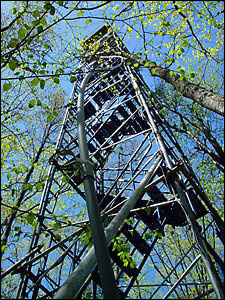NSF awards Harvard Forest $4.9 million to study landscape change
Scientists to examine forest response to natural and human disturbances across northeastern U.S.

The National Science Foundation (NSF) has awarded Harvard University’s Harvard Forest $4.9 million to study drivers, dynamics, and consequences of landscape change in New England. The six-year grant, the largest in the Harvard Forest’s 99-year history, will support research on forest responses to natural and human disturbances across the northeastern United States.
Led by Harvard Forest Director David Foster, Harvard researchers and students will collaborate with scientists from the Ecosystems Center at the Marine Biological Laboratory, the Woods Hole Research Center, Brandeis University, Michigan State University, the University of New Hampshire, and the University of Massachusetts.
“The Long Term Ecological Research [LTER] study lies at the heart of the Harvard Forest’s interdisciplinary research and education program in ecology and conservation,” Foster says. “This funding will support faculty and students across the life, physical, and social sciences at Harvard and beyond to investigate critical ecological processes and environmental issues confronting the eastern U.S.”
Foster and colleagues will examine the drivers of landscape change for human populations and diverse natural ecosystems in the eastern United States. Drivers range from microbes to moose, invasive plants to exotic insects, hurricanes to forest harvesting, and global climate change to regional land-use. Their consequences will be explored through historical and regional studies, long-term measurements, modeling, and controlled experimental manipulations – several of which are well into their second decade.
Findings could be incorporated into regional plans for land protection and management, and could inform local, state, national, and international policy on conservation, natural resource management, and the environment.
The new NSF funding continues research begun in 1988 when the Harvard Forest, a 3,000-acre ecology and conservation center in Petersham, Mass., was first named as one of the NSF’s 15 LTER sites. Established to support the lengthy research required to interpret many important natural processes, the LTER network is the largest ecological research program in the United States.
“The LTER program now includes 26 sites from the Arctic to the Antarctic, including systems as diverse as coral reefs and cities [Baltimore and Phoenix], as well as forests,” says Henry Gholz, LTER program director at the NSF. “Harvard Forest has been a central site in LTER since its establishment, making major contributions to our understanding of the legacy effects of agricultural clearing 200 years ago on today’s northeastern forests, as well as the effects of hurricanes, invasive species, and more recent forest management.”
The NSF grant will support work by more than 25 scientists, including Foster; co-investigator Aaron Ellison; Harvard faculty collaborators Kathleen Donohue, Richard Forman, Paul Moorcroft, J. William Munger, and Steven Wofsy; ecosystem scientists; ecological modelers; archaeologists; and an environmental historian.
Along with graduate students from the biological, physical, and social sciences, Harvard College undergraduates will also participate in this research effort through the Harvard Forest Summer Research Ecology Program. Education and outreach will extend from elementary to graduate students, as well as ongoing interactions with conservation organizations and public agencies.
Founded in 1907, the Harvard Forest is Harvard University’s center for field research and education in ecology and conservation, as well as one of the oldest and most intensively studied landscapes in North America. It is a department within Harvard’s Faculty of Arts and Sciences and administers Harvard’s master’s degree in forest science.
More information can be found at http://harvardforest.fas.harvard.edu.




